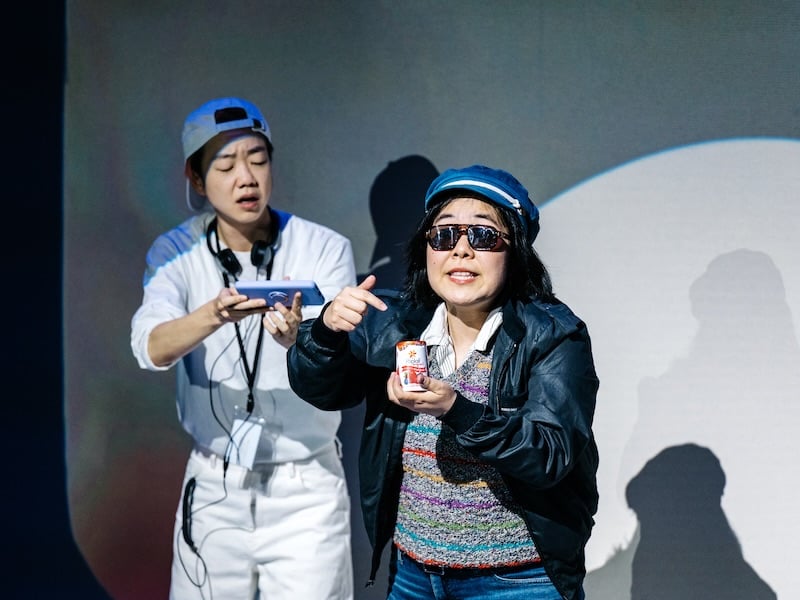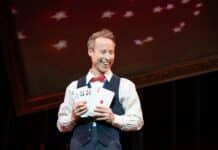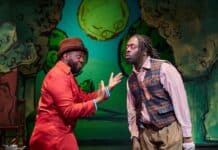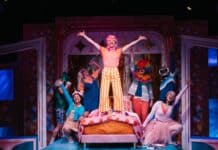“To be an artist means never to avert one’s eyes.” — Akira Kurosawa
If I were Julia Izumi thinking of a question to ask fellow actors in a meta-theatrical play, I’d want to ask one that’s been on my mind a lot recently: Do you think theater can be transformative? What can it really do when the world is on fire? Subversive art may be a weird way of communicating comfort. Yet it also makes sense to my brain, which likes things to be complicated and analyzable, even when the world could be simple. To put things in boxes, then completely turn them on their head, makes life a lot more interesting. With Akira Kurosawa at Woolly Mammoth, Julia Izumi aims to dismantle cultural labeling, and in telling a personal story, she’s as universally understood as Kurosawa himself is.
Akira Kurosawa Explains His Movies and Yogurt (with live and active cultures!) is an AAPI theater form- and content-loving critic’s dream come true, brought to life with a combination of boldly wild exaggeration and deeply grounded realism. It’s beautifully hysterical, and irreverent yet reverent. Julia Izumi’s (auto)biographical play explores the life of acclaimed filmmaker Akira Kurosawa, one of the most revered Japanese artists, intertwined with Izumi’s own traumas as a Japanese American…and random facts about yogurt. It’s not just about Kurosawa. It’s about identity and culture, grief and guilt, and understanding and truth.

Izumi pretends she knows more than she does about Kurosawa (she’s only actually seen Seven Samurai), but her play highlights three important facts: Kurosawa’s brother, Heigo — a benshi (Japanese performer who played music to narrate silent films) — influenced his work; Izumi’s mother, a painter who mostly volunteers at the Met these days, influenced Izumi’s artistry. Heigo committed suicide; so did Izumi’s uncle, whose funeral her mother didn’t attend because 12-year-old Izumi told her not to. And Japanese grief is weird; there is no word in Japanese for “miss.” Izumi goes both beautifully poetic and absolutely crazy. We love her for it.
One of the funniest things about this production is how director Aileen Wen McGroddy approaches her actors’ theatrical and meta-theatrical responses to Julia’s extreme, flawed choices. It’s funny when they embrace the style, like explaining yogurt of varying brands themselves, bursting into song, movement, and dance out of nowhere — including Jihan Haddad (covering for Ashil Lee) on ukulele, Lizzy Lewis and Haddad’s silly accents and “Alfredo kicks” as “first weeb” Italian Japanologist Giuliana Stramagioli, and Jamar Jones’ soulful theme song of “Kurosawa teeeaaa tiiime.” It’s also funny when they’re confused. Why do they have to play other characters — some of which they find offensive and show hesitation toward playing? Why is Julia writing about a filmmaker she barely knows? Is that appropriation? And what is the yogurt supposed to mean?
It’s ultimately painfully called out by charming and chill Japanese American actor Kento Morita that the yogurt interjections are a means of avoidance and deflecting from her problems. It’s at once a hysterical and heartbreaking tool, to both connect and distance the audience. Her ensemble did what she wanted the audience to do — push, question, try to understand, see past Julia’s lies — and it feels natural, funny, and relatable. When Julia finally gets real, Morita as himself offers the support of being able to talk about Japanese American issues together. And Morita as Kurosawa shows her how his brother influenced his work. It’s powerful to see that you can make a whole show based on things you don’t know, and somehow learn more about yourself.
As much as actors questioned Julia, Julia also questioned them, posing questions like “Have you ever felt not enough or too much of something?” and “Do you consider yourself a perfectionist?” (The audience is also asked to raise their hands if they can relate.) Each actor had a turn to share personal stories about their identities, as simple or as in-depth as they chose, then explain Kurosawa in a new wackadoo way. It’s refreshing to see them play themselves and others seamlessly — all including portrayals of Heigo and Kurosawa in turns, too.

Also fundamental to the show was the use of film in its design. As a whole, it creates a stripped down yet expansive, and contemporary yet classic look and feel onstage, for Wen McGroddy’s part. Projections and video design via a live camera feed with close-ups in black and white are the main tools of establishing the environment, brilliantly crafted by Patrick Lord. To add to the hilarity, projections of videos like the 1980s “Dannon body” ad play multiple times, and a spoof of the Star Wars theme with traditional Japanese instruments is played at one point. On a more serious note, projections of interstitial titles are used to narrate the brotherhood of Akira and Heigo — spoken in Japanese to the side by Morita, physically manifested with no vocals onstage by other ensemble members, and translated by supertitles while Julia converses in English.
Intertitles, in a tongue-in-cheek tone, are also used to tell Julia’s underlying story about the unspoken grief that she and her mother experience — she can’t say it herself otherwise. They’re often paired with Julia telling a completely different story than what’s written. For a show that said films are meant to be seen and not explained, the fact that some words were unspoken, those underlying words were seen, and you could see what was said and not said, makes the unseen seen.
Asian elders often think pursuing art is hard because it’s scary, and chances of survival are uncertain. That may be a reason why Izumi’s mother gave up painting. It’s powerful to see a bold new play that not only promotes the ability of storytelling to help us survive but pushes the form forward, gives comfort in living with the guilt that comes with grief that may never be fully resolved, and ultimately shares the fundamental value of art. A play that says we should keep our eyes open.
Running Time: About one hour and 45 minutes, no intermission,
Akira Kurosawa Explains His Movies and Yogurt (with live and active cultures!) plays through June 1, 2025, produced in partnership with New Georges NYC at Woolly Mammoth Theatre Company, 641 D St NW, Washington, DC. Tickets ($55-$83, with discounts available and a limited number of PWYW tickets starting at $5 for every show) can be purchased online, by phone at 202-393-3939 (Wednesday–Sunday, 12:00–6:00 p.m.), by email (tickets@woollymammoth.net), or in person at the Sales Office at 641 D Street NW, Washington, DC (Wednesday–Sunday, 12:00–6:00 p.m.). Discount tickets are also available on TodayTix.
The digital playbill is downloadable here.
COVID Safety: Masks are optional in all public spaces at Woolly Mammoth Theatre except for a mask-required performance Thursday, May 22, 8pm. Woolly’s full safety policy is available here.
Akira Kurosawa Explains His Movies and Yogurt (with live and active cultures!)
By Julia Izumi
Presented by Woolly Mammoth Theatre Company and New Georges NYC
Director: Aileen Wen McGroddy
Costume Designer: Camilla Dely
Dramaturg: Sonia Fernandez
Lighting Designer: Venus Gulbranson
Scenic Designer: Mischa Kachman
Video and Projection Designer: Patrick W. Lord
Sound Designer: Tosin Olufolabi
Casting Directors: Geoff Josselson, CSA and Jorge Acevedo
Stage Manager: JuanCarlos Contreras
CAST
Julia/Playwright: Julia Izumi
Jamar Jones
Ashil Lee
Lizzy Lewis
Kento Morita
Cover: Jihan Haddad
CREW & PRODUCTION TEAM
Assistant Production Manager: Madison Bahr
Assistant Stage Manager: Fe Miranda
Associate Scenic Designer: Sarah Beth Hall
Associate Costume Designer: Logan Benson
Associate Projection Designer: Clara Ashe-Moore
Associate Lighting Designer: Sage Green
Associate Sound Designer: Ian Vespermann
SDCF Fellow/Assistant Director: Rebecca Rovezzi
Lighting Supervisor: Sarah Chapin
Costume Supervisor: Jessica Utz
Props Supervisor: Eli Golding
Sound Supervisor: Ian Vespermann
Lighting Programmer: Susannah Cai, Angela Armstrong
Video and Projection Programmer: Jerran Kowalski
Crew and Production Team Rehearsal Production Assistant: Briana Padgett
Performance Production Assistant: Erin Schoff
Audio Assistant: Kristie Taiwo-Makanjuola
Wardrobe Supervisor: Sydney E. Bronaugh
Run Crew: Adam Franks
Light Board Operator: Dahvi Walker
A/V Board Operator: Macayla Leigh
Scenic Charge: Yaritza Pacheco
Staff Carpenters: Mickey Cappiello, Lily Anglin
Welder: Faye Joseph
Carpenters: Hakeem Ford, Carlos Hernandez, Jaye Overton, Zhy Strowbridge, Velli Jones, Jo Lau’ren Peele, Adam Franks, Randi Lee
Electricians: Annie Choudhury, Milan Robinson, Max Abramovitz, Isa Pelegero, Jordan Patnett, Jimmy Engelkemier, Benjamin Knauth, Connor Skalitzky, Toni Rachal
SEE ALSO:
Woolly Mammoth to present ‘Akira Kurosawa Explains His Movies and Yogurt (with live and active cultures!)’ (news story, April 25, 2025)



